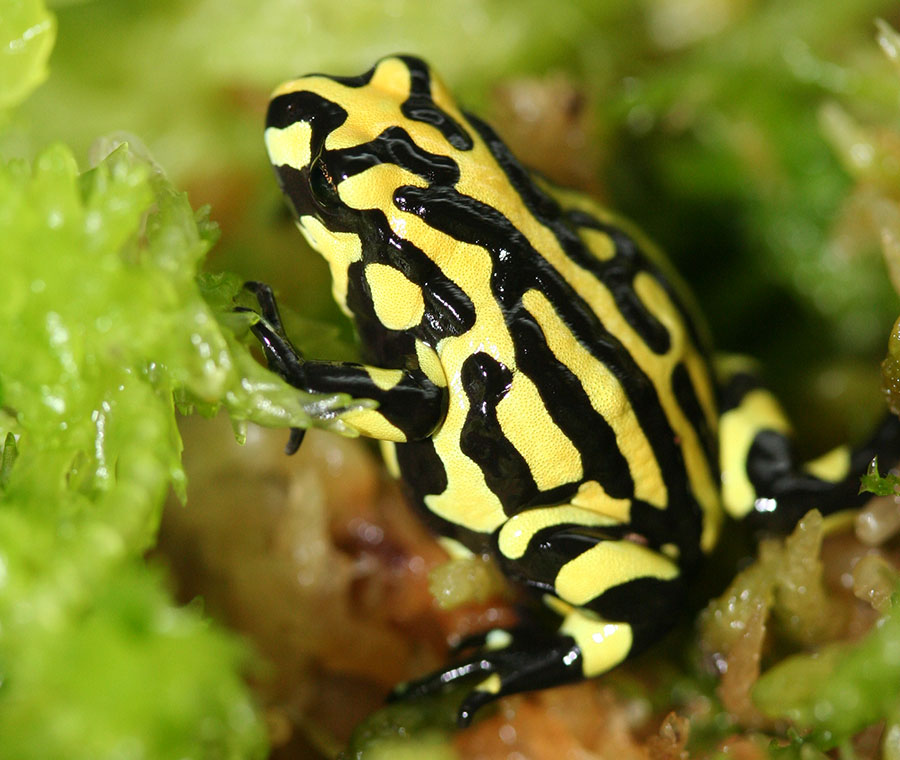February 6, 2018
Corroboree frogs to get silver-spoon start to life
Study to aid critically endangered species wins ARC Linkage Project funding
A University of Wollongong (UOW) led study that aims to give the critically endangered southern corroboree frog a “silver-spoon start to life” has received funding in the latest round of Australian Research Council (ARC) Linkage Project grants.
The project, “Nutritional requirements of the critically endangered corroboree frog”, has been awarded $334,000 over three years under the Linkage Projects scheme, announced yesterday Monday 5 February 2018) by Minister for Education and Training, Senator the Hon. Simon Birmingham.
The project will test whether giving individual frogs in a captive breeding program access to superior nutrition (a silver-spoon advantage) improves their fitness and their ability to survive once re-introduced to the wild.
UOW evolutionary biologist Dr Phillip Byrne and conservation biologist Dr Aimee Silla will be leading the study, which includes UOW plant physiologist Senior Professor Sharon Robinson.
Other research partners are the NSW Office of Environment and Heritage (OEH), Taronga Conservation Society Australia, Zoos Victoria and Deakin University. The partners collectively contributed $175,000 in funding towards the project.
“Anthropogenic environmental change and the rapid spread of infectious disease have caused a phenomenal rate of biodiversity loss and species extinction, but it is amphibians that have been most severely affected,” Dr Byrne said.
“More than one-third of amphibian species worldwide are now threatened with extinction, including the southern corroboree frog, which is one of Australia’s most critically endangered species.”
The amphibian extinction crisis has led to the establishment of captive breeding programs for a number of frog species, and while they have already had considerable success, they stand to benefit from using knowledge of nutrition.
Exposing individuals to superior nutritional conditions throughout their development is expected to increase their capacity to generate large numbers of healthy individuals, and increase the success of captive breeding programs.
Dr Byrne and Dr Silla said their team would test the effect of a group of compounds known as dietary carotenoids on a range of fitness-determining traits in southern corroboree frogs, both in captivity and in the field post-release.
Carotenoids have a powerful antioxidant capacity that reduces free radical-induced cellular damage, thereby potentially improving various fitness-determining traits in vertebrates.
Specifically, the project will quantify the effect of carotenoid dose on the frogs’ growth and development; behavioural performance; colouration and toxicity; immunity; and survivorship.
“If dietary carotenoids are found to improve corroboree frog fitness, the findings will not only be of enormous benefit to the recovery of this species, but will provide a cost effective action that could easily be incorporated into amphibian captive breeding programs globally,” Dr Silla said.
The ARC Linkage Projects scheme brings university researchers together with industry partners to undertake new research project collaborations that will deliver practical solutions to real-world problems.
 The southern corroboree frog is one of Australia's most critically endangered species. Can giving corroboree frogs a "silver-spoon" start to life improve their chances of survival? Picture: Dr Aimee Silla.
The southern corroboree frog is one of Australia's most critically endangered species. Can giving corroboree frogs a "silver-spoon" start to life improve their chances of survival? Picture: Dr Aimee Silla.
:format(jpg)/prod01/channel_3/assets/live-migration/www/images/content/groups/public/web/media/documents/mm/uow243400.jpg)